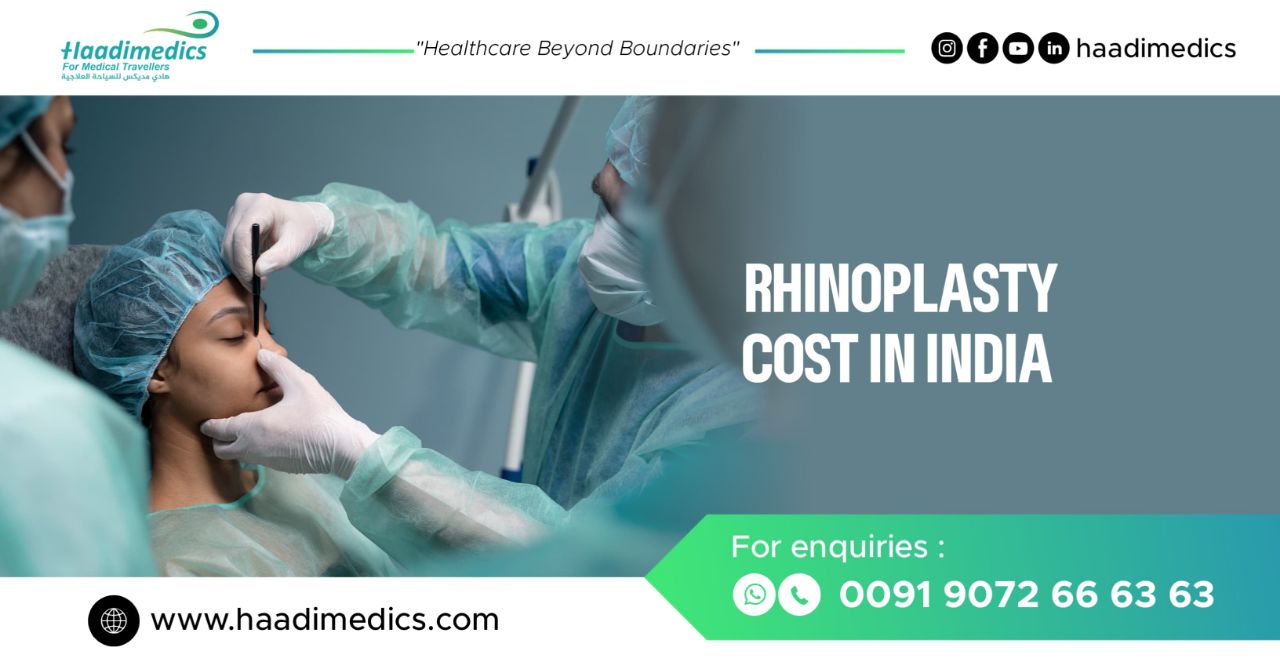India has emerged as a leading destination for medical tourism, offering world-class healthcare facilities at a fraction of the cost in developed countries. Rhinoplasty, commonly known as 'nose job', is one of the procedures where India has witnessed significant success. With skilled surgeons, state-of-the-art infrastructure, and competitive pricing, India has become a hub for individuals seeking cosmetic enhancements.
What is Rhinoplasty?
Rhinoplasty is a surgical procedure aimed at altering the shape, size, or appearance of the nose. It can be performed for cosmetic reasons to enhance facial beauty or for functional purposes to address breathing difficulties or deformities caused by injury or birth defects.
Why is it done?
1. Correcting nasal asymmetry
2. Reshaping the nasal tip
3. Straightening a crooked nose
4. Improving breathing difficulties
5. Correcting birth defects or injuries
Preparation
Before undergoing Rhinoplasty, patients typically consult their surgeons to discuss their goals, medical history, and expectations. Pre-operative instructions may include avoiding certain medications like aspirin, arranging for transportation on the day of surgery, and refraining from eating or drinking before the procedure.
Procedures
There are two ways to conduct Rhinoplasty: open and closed. In the closed approach, incisions are made inside the nostrils, while in the open approach, a small incision is made across the columella (it is the tissue that divides the nares and connects the nasal tip to the nasal base), the strip of tissue between the nostrils. The surgeon then reshapes the bone and cartilage to achieve the desired outcome.
What to Expect?
Before surgery, patients should clearly understand the expected outcomes and any potential risks involved.
During the procedure, patients are typically under general anesthesia to ensure comfort.
After surgery, patients may experience swelling, bruising, and discomfort, which can be managed with medication and proper care. It's essential to follow post-operative instructions provided by the surgeon to facilitate healing and achieve optimal results.
Different Types of Treatment
Apart from traditional Rhinoplasty, other variations include revision Rhinoplasty (to correct unsatisfactory results from previous surgery), ethnic Rhinoplasty (tailored to the patient's ethnic features), and septoplasty (focused on correcting deviated septum for improved breathing).
Best Hospitals in India for the Surgery
- Apollo Hospitals, Chennai
- Fortis Healthcare, Delhi
- Manipal Hospitals, Bangalore
- Medanta - The Medicity, Gurgaon
- Sir H.N. Reliance Hospital, Mumbai
- Richardson’s Dental and Craniofacial Hospital, Tamil Nadu
- CARE Hospital, Hyderabad
Best Surgeons in India for the Surgery
- Dr. Manoj Johar, Max Super Speciality Hospital, Delhi
- Dr. Anil Kumar Behl, Fortis Memorial Research Institute, Gurgaon
- Dr. Avtar Singh Bath, BLK Super Speciality Hospital, New Delhi
- Dr. Prateek Arora, Max Super Specialty Hospital Saket, New Delhi
- Dr. Kaveshvar Ghura, Fortis Hospital, Gurgaon
- Dr. Sunil Richardson, Richardson’s Dental and Craniofacial Hospital, Tamil Nadu
Top Nations in Rhinoplasty
While India stands out as a prominent destination for Rhinoplasty, other countries known for their expertise in cosmetic surgery include Turkey, the United States, South Korea, Brazil, and Thailand.
Cost Comparison
New Delhi – USD 1450
Chennai – USD 1488
Mumbai – USD 1455
Bangalore – USD 1450
Hyderabad – USD 1430
Kerala – USD 900
Turkey – USD 2000
Thailand – USD 3280
Germany – USD 2000
Singapore – USD 2400
Analyzing the costs, it's evident that Rhinoplasty costs vary significantly depending on the location. India offers some of the most competitive prices, with Kerala providing the most cost-effective option. Among Indian cities, Hyderabad offers the lowest, while Chennai and Mumbai have a slightly higher cost.
FAQ
1. Is Rhinoplasty painful?
- Patients may experience discomfort during the initial recovery period, but pain is typically manageable with prescribed medication.
2. What is the duration of recovery following a Rhinoplasty?
- While recovery times vary, most patients can expect swelling and bruising to subside within a few weeks, with final results becoming apparent within several months.
3. Are there any risks associated with Rhinoplasty?
- Like any surgical procedure, Rhinoplasty carries potential risks such as infection, bleeding, and unfavorable scarring. With the right pre-operative evaluation and post-operative care, these risks can be reduced.
4. Can Rhinoplasty improve breathing difficulties?
- Yes, Rhinoplasty can address structural issues that contribute to breathing problems, such as a deviated septum or nasal obstruction.
5. Will insurance cover the cost of Rhinoplasty?
- The type of insurance that covers Rhinoplasty differs based on the purpose of the treatment. While cosmetic Rhinoplasty is typically not covered, insurance may cover functional Rhinoplasty aimed at improving breathing difficulties.
6. How long do the results of Rhinoplasty last?
- Rhinoplasty results are long-lasting and can be permanent. However, the final outcome may take several months to fully stabilize as swelling subsides and tissues heal.
7. Can I wear glasses after Rhinoplasty?
- Patients are usually advised to avoid wearing glasses that rest on the bridge of the nose for several weeks after surgery to prevent pressure on the newly operated area.
8. When can I resume normal activities after Rhinoplasty?
- While patients can typically return to work or school within a week after surgery, strenuous activities should be avoided for several weeks to ensure proper healing.
9. Will Rhinoplasty leave visible scars?
- With the closed Rhinoplasty technique, scarring is minimal as incisions are made inside the nostrils. In open Rhinoplasty, a small scar may be visible on the columella, but it typically fades over time and is discreetly hidden.
10. Am I a suitable candidate for Rhinoplasty?
- Ideal candidates for Rhinoplasty are individuals in good overall health with realistic expectations about the outcomes of the procedure. It's essential to consult with a qualified surgeon to determine candidacy and discuss goals and concerns.


Comments